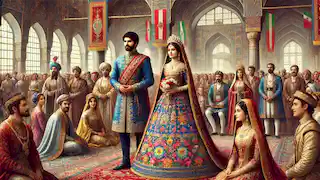In the land of ancient Persia, amidst the vast deserts and towering mountains, there existed a hero whose name was whispered in awe for generations to come. This is the tale of Siyâvash, the prince of innocence and tragedy, whose journey through life became a timeless legend in Iran's rich cultural history. Siyâvash’s story is not just one of valor and honor but also of betrayal, love, and an undying pursuit of justice. His legacy shaped the fate of his kingdom and influenced the lives of countless generations. His tale reflects not only the valor of a hero but the fragility of innocence when faced with the cruelties of fate. Born to King Kay Kâvus, the ruler of Iran, and a noblewoman named Sudâbeh, Siyâvash was destined for greatness from the moment of his birth. His lineage carried the weight of royalty, but his path was far from easy. From an early age, Siyâvash was raised under the care and tutelage of Rustam, the mighty warrior and champion of Persia. Rustam taught the young prince not only the ways of combat but also the values of honor, humility, and loyalty. Under Rustam’s guidance, Siyâvash grew into a handsome and skilled warrior, beloved by the people of Iran. His strength was unparalleled, but it was his purity of heart and sense of justice that truly set him apart. Siyâvash’s presence brought joy to those around him, and he was admired by his peers and elders alike. However, despite the love and admiration Siyâvash received, the court was not without its dangers. King Kay Kâvus, though a powerful ruler, was often easily swayed by the intrigues of his court, and Sudâbeh, Siyâvash’s stepmother, harbored dark desires for the young prince. As Siyâvash matured, Sudâbeh became infatuated with him. She plotted to seduce him and sought to manipulate him into becoming her lover. But Siyâvash, loyal to his father and honorable by nature, refused her advances. Sudâbeh, angered and humiliated, devised a sinister plan to ruin the young prince. Sudâbeh falsely accused Siyâvash of attempting to seduce her, knowing well that King Kay Kâvus’s temper could be roused against his son. Shocked and heartbroken by the accusations, Siyâvash had no way to prove his innocence. The court was divided, with many believing Sudâbeh’s lies. But Siyâvash, ever the noble soul, accepted the challenge that lay before him. He proposed a trial by fire, a sacred and ancient test of purity. If he were truly innocent, he would walk through the flames unharmed. King Kay Kâvus, torn between his love for his son and his loyalty to his queen, agreed to this test, knowing it was the only way to resolve the matter. The day of the trial came, and a massive fire was built in the heart of the kingdom. Thousands gathered to witness the spectacle, and as the flames roared into the sky, Siyâvash walked calmly into the inferno. To the amazement of all, the prince emerged from the flames untouched, his clothes and skin unmarred by the fire. This divine sign proved Siyâvash’s innocence, and Sudâbeh’s treachery was exposed. Though she was spared from immediate punishment by the king’s mercy, her plot had failed. Yet, despite his vindication, Siyâvash knew that he could no longer remain at court, for the seeds of mistrust had been sown. He requested permission to leave the kingdom and seek his destiny elsewhere, away from the poisonous intrigues of the royal court. With a heavy heart, King Kay Kâvus granted his son’s wish. Siyâvash, ever dutiful, bid farewell to his father and the land of his birth. Accompanied by a handful of loyal companions, the prince journeyed to the kingdom of Turan, ruled by the mighty Afrâsiyâb, who had long been an enemy of Iran. Though many feared that Afrâsiyâb would imprison or kill the young prince, Siyâvash believed in the power of diplomacy and the possibility of peace. Upon reaching Turan, Siyâvash met with Afrâsiyâb and proposed a peaceful alliance between their two nations. Impressed by the young prince’s courage and wisdom, Afrâsiyâb agreed to the alliance and welcomed Siyâvash into his court. The two leaders forged a bond of friendship, and Siyâvash was soon given a place of honor in Turan. In time, Afrâsiyâb offered his daughter, Farangis, in marriage to Siyâvash, further solidifying the bond between their kingdoms. The marriage was a joyous occasion, and Siyâvash, now a prince of both Iran and Turan, hoped that his union would bring lasting peace to the region. For a time, peace reigned, and Siyâvash and Farangis lived in happiness. The people of Turan grew to love the prince, who ruled with fairness and kindness. His wisdom and diplomatic skills earned him the respect of both his subjects and his former enemies. It seemed that Siyâvash had finally found the peace he had long sought. However, the peace was not to last. Within the court of Afrâsiyâb, there were those who resented Siyâvash’s influence. Garsivaz, the brother of Afrâsiyâb, was chief among them. Jealous of the love and admiration Siyâvash received, Garsivaz began to sow discord between Afrâsiyâb and the young prince. He whispered lies into the king’s ear, convincing him that Siyâvash harbored ambitions to overthrow him and claim the throne of Turan for himself. Afrâsiyâb, already a man prone to suspicion and paranoia, began to believe these lies. The once-strong bond between the king and Siyâvash began to fray, and soon the prince found himself accused of treason. Despite his innocence, Siyâvash knew that the weight of the accusations against him was too great to overcome. He refused to fight his father-in-law or his adopted kingdom, choosing instead to accept his fate with dignity. Afrâsiyâb, blinded by his mistrust, ordered that Siyâvash be put to death. On the day of his execution, Siyâvash was led to the mountains outside of the city. There, he met his end, his life cut short by betrayal and jealousy. Yet even in death, the prince remained a symbol of purity and honor. His final words were a prayer for peace between Iran and Turan, a wish that would not be fulfilled in his lifetime but would echo through the ages. News of Siyâvash’s death spread quickly, and the people of both Iran and Turan mourned the loss of their beloved prince. Afrâsiyâb, once the proud ruler of Turan, was left haunted by guilt and regret for the rest of his days. His kingdom, once united under his rule, began to crumble as internal strife and rebellion took hold. Farangis, pregnant with Siyâvash’s child, fled to safety, vowing to protect the legacy of her husband. In time, she gave birth to a son, Kay Khosrow, who would grow to become one of Iran’s greatest kings. Under Kay Khosrow’s reign, the land would find peace, and the bloodshed between Iran and Turan would eventually cease. But the memory of Siyâvash remained strong, a reminder of the cost of innocence and the perils of betrayal. Generations would pass, and the legend of Siyâvash would become one of Iran’s most cherished stories. Poets and storytellers immortalized his tale in epic poems, most famously in Ferdowsi’s *Shahnameh*, where the tragic prince became a symbol of honor, justice, and the enduring struggle between good and evil. In the end, Siyâvash’s legacy was not defined by his tragic death but by the purity of his spirit and the love he inspired in those who knew him. He was a hero in the truest sense, not because of the battles he fought or the enemies he defeated, but because of his unwavering commitment to justice, his refusal to be corrupted by power, and his ability to rise above the darkest of circumstances. The tale of Siyâvash remains a powerful reminder of the timeless struggle between good and evil, honor and betrayal. Though he lived centuries ago, his story continues to inspire those who seek to live with integrity and courage in a world often filled with deceit and treachery. Siyâvash’s life may have been brief, but his impact endures, a beacon of hope and righteousness for all who hear his name.The Early Years of Siyâvash
The Trial of Innocence

Siyâvash’s Exile

The Betrayal of Afrâsiyâb

The Legacy of Siyâvash

Conclusion
The Legend of Siyâvash
Reading Time: 7 min

About Story: The Legend of Siyâvash is a Legend Stories from iran set in the Ancient Stories. This Dramatic Stories tale explores themes of Good vs. Evil Stories and is suitable for All Ages Stories. It offers Moral Stories insights. A tale of honor, betrayal, and the undying pursuit of justice in ancient Persia.

















